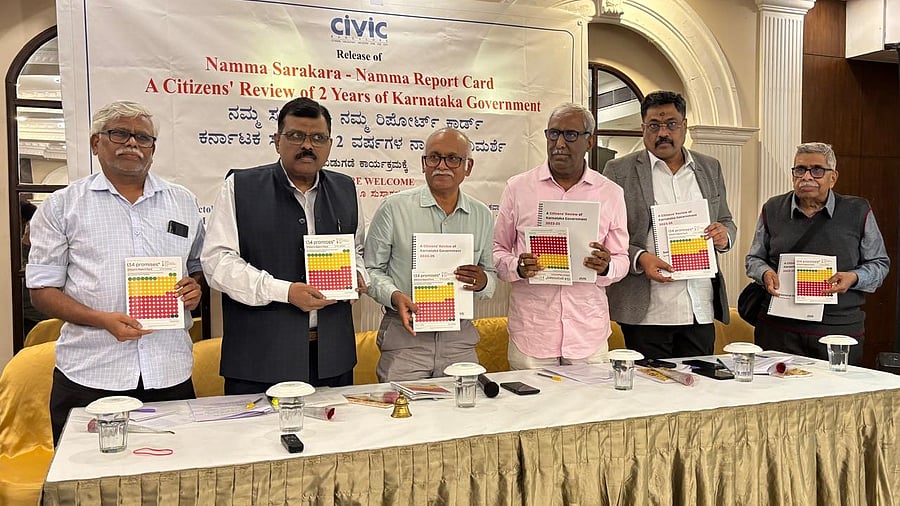
Credit: Special Arrangement
The Congress-led state government, completing two years in office, has received a mixed bag of assessments from CIVIC-Bangalore, which released its ‘Citizens’ Review’ in Bengaluru on Friday.
The review, based on a Manifesto Report Card and a Sectoral Review, highlights a stark contrast between the successful rollout of the “five guarantees” and significant lags across other crucial governance sectors.
The report card, which analysed the status of 134 manifesto promises using RTI responses and public data, concluded that the incumbent party
has an overall 6.7% fulfilment rate. This figure is almost entirely driven by the 100% fulfilment of the five guarantee schemes.
Excluding the guarantees, the fulfilment rate plummets to a mere 3.1% across the remaining seven key domains, including mining, forests and environment protection, education, health, Namma Bengaluru, urban development, administration and governance, guarantee schemes and the unorganised sector.
The analysis has revealed that “No Work Has Started” on a majority of promises (54.5%), with the urban development sector faring the worst at 70% of promises not started. Health and administration, and governance followed closely at 64.3% each.
Key promises stalled include the regularisation of Pourakarmikas (in progress) and setting a strict timeline for local body elections (not started). Two promises, completing pending metro projects and filling teacher vacancies within one year, were marked as failed.
The sectoral review painted a complex picture, noting commendable welfare steps like extended school nutrition programs and proactive drought relief. However, these are often undermined by systemic failures.
In Education, over 62,000 teacher vacancies remain unfilled, and expenditure lags below the national average. The Public Health sector is described as a “piecemeal” approach, with overall allocation remaining low at about 4%, raising concerns that a growing trend of privatisation is threatening universal healthcare.
Regarding Bengaluru, the report slammed the “Undemocratic, Unplanned, Unsustainable” governance, criticising the delayed municipal elections and the unconstitutional Greater Bengaluru Governance Act (GBGA).
The organisation noted that the government’s land use policies in Agriculture and its repeated granting of environmental clearances for infrastructure in protected areas indicate a model that “systematically disregards environmental safeguards.”
The panel pointed to the revenue deficit crisis, where the state has shifted to a revenue deficit for three consecutive years since the guarantees were introduced, meaning it is borrowing money to cover regular expenses (like subsidies), which is considered financially unsustainable.
Breaching fiscal limits
The state is dangerously close to or is hitting the limits set by the Fiscal Responsibility and Budget Management (FRBM) Act, with debt liabilities at 24.9% of the GSDP (against a 25% limit) and the Revenue Deficit at 0.9% (ideally should be zero).
The review panel, presided over by senior retd IAS Officer T R Raghunandan, saw spirited responses from political party spokespersons and civil society experts, like A Krishna Prasanth, A R Vasavi, Kathyayini Chamaraj and others.
